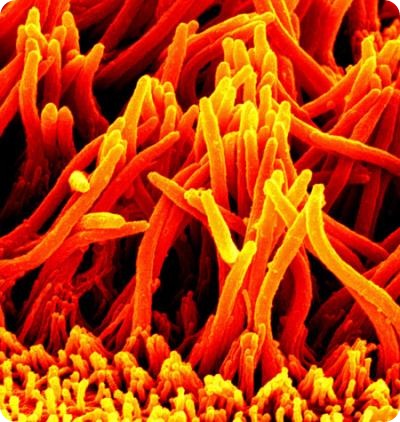Jul 24 2009
The same mechanism that helps you detect bad-tasting and potentially poisonous foods may also play a role in protecting your airway from harmful substances, according to a study by scientists at the University of Iowa Roy J. and Lucille A. Carver College of Medicine.
The findings could help explain why injured lungs are susceptible to further damage.
The study, published online July 23 in Science Express, shows that receptors for bitter compounds that are found in taste buds on the tongue also are found in hair-like protrusions on airway cells. In addition, the scientists showed that, unlike taste cells on the tongue, these airway cells do not need help from the nervous system to translate detection of bitter taste into an action that expels the harmful substance.
The hair-like protrusions, called motile cilia, were already known to beat in a wave-like motion to sweep away mucus, bacteria and other foreign particles from the lungs.
The study is the first to show that motile cilia on airway cells not only have this "clearing" function, but also use the receptors to play a sensory role. The researchers also found that when the receptors detect bitter compounds, the cilia beat faster, suggesting that the sensing and the motion capabilities of these cellular structures are linked.
"On the tongue, bitter substances trigger taste cells to stimulate neurons, which then evoke a response -- the perception of a bitter taste. In contrast, the airway cells appear to use a different mechanism that does not require nerves," said Alok Shah, a UI graduate student and co-first author of the study. "In the airways, bitter substances both activate the receptors and elicit a response -- the increased beating of the cilia -- designed to eliminate the offending material."
Shah and co-first author Yehuda Ben-Shahar, Ph.D., an assistant professor of biology at Washington University who was a postdoctoral fellow at the UI when the study was conducted, worked in the lab of senior study author Michael Welsh, M.D., UI professor of internal medicine and molecular physiology and biophysics, who holds the Roy J. Carver Chair of Internal Medicine and Physiology and Biophysics. Welsh also is a Howard Hughes Medical Institute investigator.
"These findings suggest that we have evolved sophisticated mechanisms to guard ourselves from harmful environmental stimuli," Ben-Shahar said. "Our work also suggests that losing cilia in the lungs, due to smoking or disease, would result in a reduced general ability to detect harmful inhaled chemicals, increasing the likelihood of further damaging an injured lung."